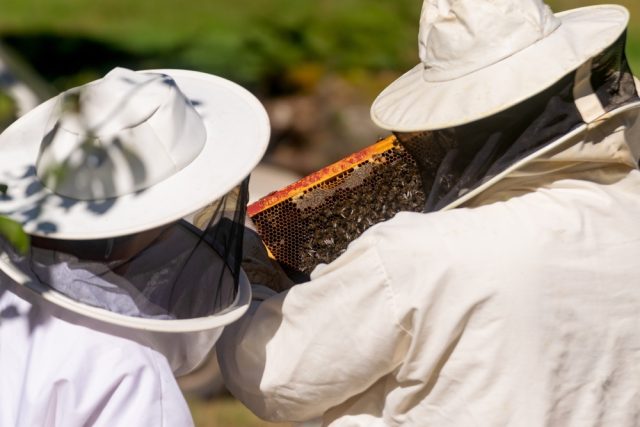
Primary sector workers across Europe have faced a range of challenges, from fluctuating global markets and shifting agricultural policies to mounting environmental pressures. Among these industries, beekeeping—a profession crucial to both rural economies and ecosystems—has been hit particularly hard. Despite often being regarded as a niche or traditional practice, beekeeping plays a vital role in food security and biodiversity, serving as a cornerstone for pollination and crop health. However, the sector is now grappling with a major threat: the proliferation of fraudulent honey imports.
In Spain and other European countries, including France and Portugal, beekeepers have raised urgent concerns about the rise of counterfeit honey on the market. This influx of fraudulent products, primarily composed of sugar, water, and other artificial substitutes, is jeopardising the survival of many rural beekeeping operations. Under the slogan “European Beekeepers Against Fraud: Manufactured Syrups Are Not Honey,” thousands of beekeepers recently protested outside the European Commission’s headquarters in Madrid. Organised by the agricultural association COAG (Coordinator of Organisations of Farmers and Ranchers), the demonstration highlighted the growing crisis facing the sector.
One of the beekeepers’ primary complaints is that these fraudulent imports are being sold at significantly lower prices than authentic honey, placing domestic producers at a severe disadvantage. According to Pedro Lascertales, COAG’s head of the beekeeping sector, authorities have largely turned a blind eye to this issue, despite the escalating damage it has caused. Counterfeit honey is flooding the market, driving down prices and making it increasingly difficult for legitimate producers to compete.
The problem extends beyond Spain. Protests have also been held in neighbouring countries like France and Portugal. A European Commission report published in March revealed that 51% of honey imports to Spain are fraudulent, with 85% of the companies involved in these scams continuing to operate without significant repercussions. The absence of stringent border controls has allowed these imports to enter the European market largely unchecked, misleading consumers and undermining the livelihoods of beekeepers across the continent.
The impact of this crisis goes beyond economic concerns. Bees are essential to pollination, which underpins global food production and ecosystem health. In the European Union, approximately 84% of plant species rely on pollinators such as bees, making the beekeeping sector critical to maintaining biodiversity and food security. Experts estimate that nearly 90% of the world’s crops depend on pollination, underscoring the far-reaching consequences of a weakened beekeeping industry. Fraudulent honey imports, therefore, pose not only an economic threat but also an ecological one.
Economically, Spain’s beekeeping sector plays a significant role in both domestic and international markets. The country produces between 27,000 and 30,000 tonnes of honey each year, supported by 2.8 million hives and around 37,000 beekeeping operations, many of which are transhumant (seasonally migrating between regions). Despite this strong production capacity, the sector faces fierce competition from imported honey, particularly from countries like China, Ukraine, and Portugal.
Although Spanish honey is renowned for its exceptional quality and enjoys high demand in international markets, such as the United States and Arab countries, domestic producers struggle to compete with the low-cost counterfeit products flooding the market. Fraudulent honey, often made from inexpensive ingredients, is sold at prices as low as two euros per kilo. This price point is highly attractive to large distributors and retailers, putting pressure on authentic producers whose honey, priced at approximately four euros per kilo, adheres to strict quality standards and reflects the unique characteristics of its regional origin.
This unfair competition has prompted calls for stronger regulatory action from both national governments and European institutions. Beekeepers argue that protecting the integrity of their sector requires a robust crackdown on fraud and stricter enforcement of trade regulations. Without such measures, the long-term viability of European beekeeping is at serious risk.
Efforts to combat the crisis must include enhanced border controls, greater transparency in product labelling, and increased penalties for companies found to be involved in honey fraud. Additionally, consumer awareness campaigns could play a crucial role in promoting the value of high-quality, sustainably produced honey, encouraging consumers to support local beekeepers.
The stakes are high. Beekeeping is not just an economic activity—it is a vital component of Europe’s environmental sustainability. Protecting this sector is essential to preserving both rural livelihoods and the ecosystems that depend on healthy pollinator populations. As protests continue and pressure mounts on policymakers, the future of European beekeeping will depend on whether decisive action is taken to address the fraud crisis.



 Subscribe
Subscribe